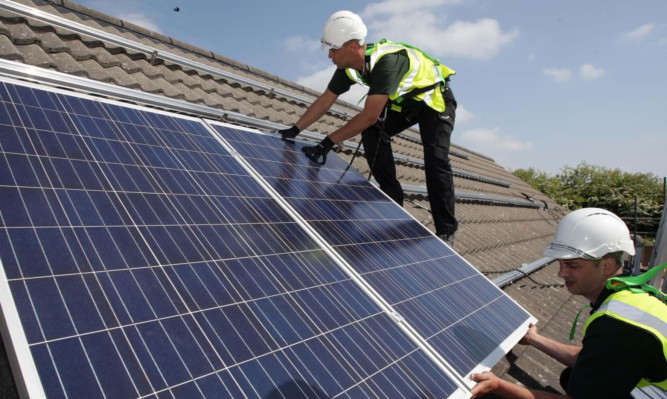The planning rules on the installation of some renewable technology should be changed to make it easier for households and businesses to reduce their carbon emissions, environmental groups have said.
WWF Scotland, RSPB Scotland and Stop Climate Chaos Scotland are backing proposals to extend permitted development rights for solar panels on non-domestic buildings and for air source heat pumps on homes.
The change would mean that those who wish to install the measures would be able to do so without applying for planning permission in most cases.
Permitted development rights can reduce costs for applicants and building owners by removing the fees and costs associated with the planning application process.
The environmental groups have submitted their views to a Scottish Government consultation on the issue.
They said the measure would bring Scotland into line with England and Wales, and help support the market for air source heat pumps and solar panels.
The change for solar panels on non-domestic properties would bring the rules more closely into line with those for solar panels on homes.
At present, almost 35,000 homes and only 600 businesses currently have solar panels installed.
Gina Hanrahan, climate and energy policy officer for WWF Scotland, said: “This move will make it easier for more people and businesses across Scotland to install their own renewable and low carbon sources of heat and power, helping to cut climate emissions, support jobs in new sectors and cut energy bills long-term.
“Extending permitted development rights to these promising technologies will reduce complexity and cost for consumers, and hopefully lead to greater uptake.”
RSPB Scotland conservation policy officer Alexa Morrison said: “These proposals by the Scottish Government would make it easier and cheaper for people and businesses to get involved in Scotland’s low carbon transition, particularly important in the face of uncertainties in the renewables sector at the moment.
“Scotland needs a renewable energy transition in harmony with nature and these types of small-scale technologies can deliver significant carbon reductions, and at the same time benefit local people and businesses.
“In particular, heating accounts for around half of Scotland’s carbon emissions, so making it easier for people to install renewable heat technologies in their homes would be a very positive step.”
The government’s consultation closes today.
